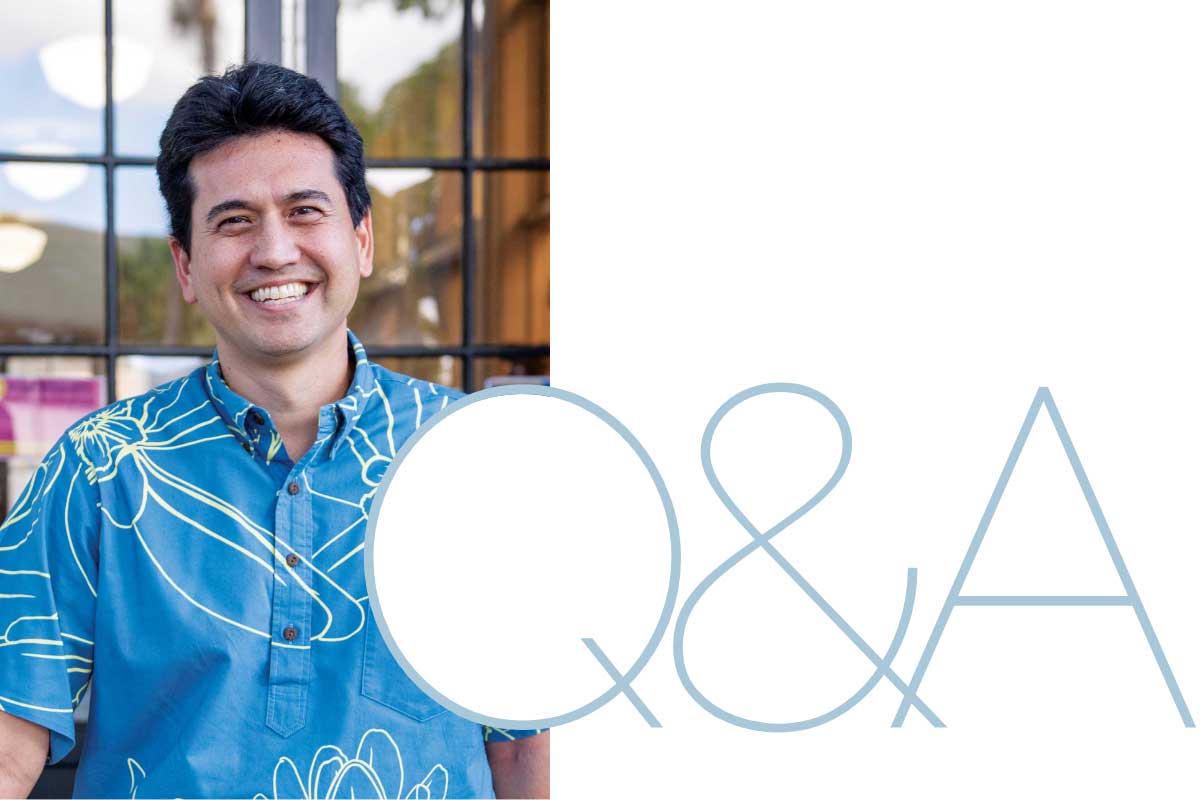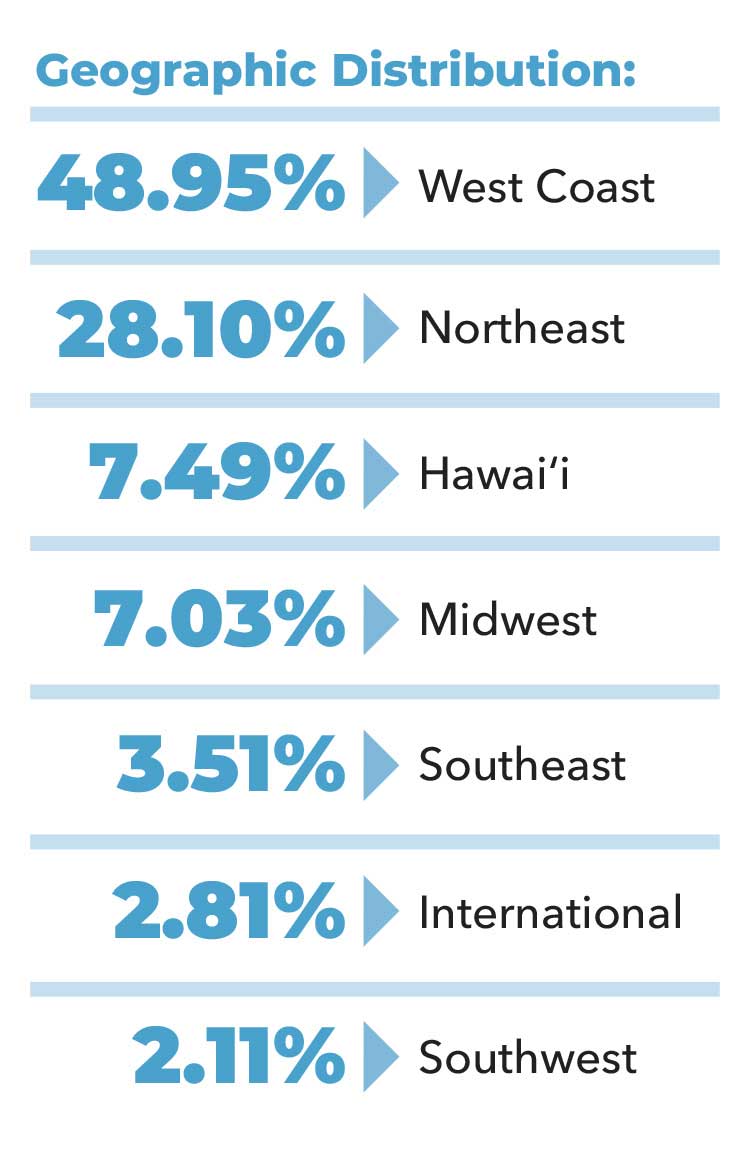
Supporting Students through the College Admissions Process
“Everything we do is student care,” says Ryan Scudder, Punahou’s director of college counseling. “We are constantly finding ways to better serve our students in this important process of transition.”
Scudder has been helping Punahou students maneuver through college admissions for nine years and, in his new role, he hopes to continue upholding the department’s student-centric approach.
“I love having the opportunity to work with students making decisions for their futures. To be a part of their journey is such a rewarding experience,” he says. “Punahou has such a diverse student body with such unique needs. I’m blessed to be able to work with such amazing, dedicated and talented colleagues in this ever-evolving arena.”
Scudder graduated from the University of Hawai‘i at Mānoa with a bachelor’s in public relations but quickly realized that his true passion was in education and spent his early professional years as a teacher and tutor in public schools.
During this time, he coached volleyball and assisted student-athletes. Through the recruiting process, he found his calling: college counseling. He then attained his master’s in counseling psychology at Chaminade University. Prior to Punahou, Scudder spent three years at Saint Francis School as director of college counseling.
Scudder has a deep passion for his craft and is grateful to be part of a team. “I came to Punahou having experience in college counseling as an office of one. But when I began working with seasoned colleagues their passion, knowledge and dedication became cornerstones for my professional growth,” he says. “I look forward to continue increasing the depth and breadth of this profession.”
Application Matters: Making Sense of Variations in Standardized Testing Requirements
The old adage among college applicants that nothing in life is certain, except for death, taxes and standardized tests, may need to be retooled. A growing number of colleges and universities are experimenting with “test-optional” models, which essentially put the decision of whether – or not – to share assessment results in the hands of the applicants.
For decades standardized tests, including the SAT and ACT, were considered central pillars in the application process – and they still are for most colleges. But, according to FairTest, an organization advocating for limited applications of standardized assessments, approximately 1,700 academic institutions will not require standardized scores during the 2023 fall admissions cycle.
Ryan Scudder sat with the Bulletin to help families and students make sense of this unfolding trend:
Some colleges are experimenting with test-optional models when submitting SAT/ACT scores in admissions. What precipitated this change?
Standardized tests were thought to give colleges opportunities to understand applicants’ potential. But even before the pandemic, a lot of colleges were realizing that they could assess the strengths of a student without standardized testing because there was a growing consensus that those tests may carry biases.
The pandemic accelerated this evolution in 2020, when access to testing sites dwindled as a result of COVID-19 closures. That forced the hand of colleges to basically tweak their protocols. So during that time, instead of making testing a part of the student’s application, it became optional. Since then, some colleges have realized that they were able to admit students of equal caliber without standardized testing as a piece of their application.
What does test-optional actually mean?
There are different terminologies to understand. There’s ‘optional’ meaning that the school still could look at the scores. It still could be a part of the applicant’s review process, if the student chooses to share it – or the student could choose not to share it. A lot of schools live in that optional world. Then, there are those that are test-blind, which is basically test-free. Tests are not expected of any applicants whatsoever.
Is this a permanent change?
College admission requirements are continuously evolving and we are monitoring them on a case-by-case basis. For colleges, including public institutions in Florida, Georgetown University and U.S. Service Academies, test score requirements remained steady – even throughout the pandemic. Meanwhile, some colleges, including M.I.T. and Georgia Tech, altered their requirements during the pandemic but are now reverting to making standardized tests mandatory. Yet other institutions, like the colleges in the University of California system and the California State University system, have stuck to test blind requirements. We are taking it year by year and figuring out what they all require. Colleges are reviewing their policies to ensure they best serve their institutional needs.
What alternative criteria are the colleges that have made SAT/ACT optional looking at?
What all colleges try to do is conduct a holistic review of an applicant. They’re looking at a student through a lot of different lenses. One of the main focuses is still academics. They want to make sure that the applicant is going to be able to handle the academic rigor at the college level. The personal essay is always a big piece of the application, as are recommendation letters because they provide diverse perspectives about the student. Colleges also want to understand their background. Are they a first-generation going to college? What have they been able to do in relation to the high school they’re attending? How have they taken advantage of the curriculum that’s before them? Then, extracurricular-wise, what are the things that the students are involved in?
How can a student find out which colleges are not making standardized tests mandatory?
The easiest way is if you know of the school specifically and then go to the admissions page, which lists all their requirements for admission. College search engines are also helpful – students can pop in various criteria, whether it’s academic, or social criteria, location, major, etc. Some of the engines are getting advanced enough where one of the options is, “Is the school test-optional, test-blind?” You can click on those filters and find out.
What are Punahou students doing?
Our students tend to perform well on standardized tests so the majority will decide to share, even if they are applying to a college that has a test-optional policy. Qualifying SAT scores (or ACT scores) allow students to be considered as a U.S. Presidential Scholar. Our student population still prepares to take standardized tests by taking the PSAT in 10th and 11th grade. There is no cookie-cutter approach. We work individually with the student to provide individualized advice.

College Whereabouts
The Class of 2023 enrolled in 157 different institutions around the world, with 99% being 4-year colleges or universities.
